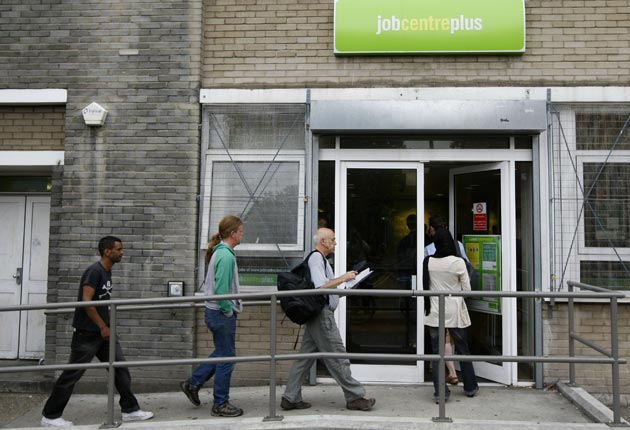Fresh job losses will cast shadow over election
Almost half of firms say they may have to make redundancies by Easter

Your support helps us to tell the story
From reproductive rights to climate change to Big Tech, The Independent is on the ground when the story is developing. Whether it's investigating the financials of Elon Musk's pro-Trump PAC or producing our latest documentary, 'The A Word', which shines a light on the American women fighting for reproductive rights, we know how important it is to parse out the facts from the messaging.
At such a critical moment in US history, we need reporters on the ground. Your donation allows us to keep sending journalists to speak to both sides of the story.
The Independent is trusted by Americans across the entire political spectrum. And unlike many other quality news outlets, we choose not to lock Americans out of our reporting and analysis with paywalls. We believe quality journalism should be available to everyone, paid for by those who can afford it.
Your support makes all the difference.Gordon Brown will be forced to fight the general election against the backdrop of accelerating job losses, a report warns today.
The Chartered Institute of Personnel and Development (CIPD) says that unemployment rates will increase sharply as the public sector feels the impact of cost-cutting. Dole queues will increase to 2.8 million in the second half of the year, a rise of up to 50,000 a month.
The forecast, which dashes hopes that Britain is poised to make a strong recovery from recession, discovered that more than a quarter of firms are still planning redundancies.
Unemployment unexpectedly dropped by 7,000 to 2.458 million last month, but it appears that the fall will not be maintained. In its survey of more than 700 employers, the CIPD found the private sector intended to take on modest numbers of new staff, although redundancies are continuing in manufacturing, often seen as the lifeblood of the economy. But the planned recruitment was far outweighed by threatened job losses in the state sector, with high numbers of redundancies looming among civil servants, local authority staff and defence workers.
Yvette Cooper, the Secretary of State for Work and Pensions, has also warned that unemployment would rise until the summer. Ministers had originally hoped that joblessness rates would level out by Easter when the campaigning for the general election expected on May 6 will be in full swing. If joblessness continues to surge, they will have to deploy the politically trickier argument that unemployment would have risen more quickly had Labour not been in office.
Dame Margaret Eaton, the LGA chairman, said: "Town halls have been swept by the cold winds of recession. Up and down the country, many councils feel they have to take the decision to cut jobs in response."
The CIPD report comes ahead of new unemployment figures on Wednesday. The CIPD found that those employers who intended to make redundancies were planning to axe 6.2 per cent of their workforce in the first three months of 2010. More than a quarter said they planned to make redundancies, while a further fifth could not rule it out. The survey also found that one in ten companies intended to outsource jobs abroad this year to countries with cheaper workforces.
John Philpott, the chief economic adviser at the CIPD, said: "The UK jobs market is still on the ropes, with a public-sector fall in employment now a reality." Alan Downey, the head of public sector at KPMG, which helped with the research, added: "It is now only a matter of time before we are faced with the deepest and most prolonged cuts in public expenditure that anyone can remember."
Theresa May, the shadow work and pensions secretary, said: "While we hope there are no fresh job cuts, there are underlying trends in the economy which are a cause of concern. It is deeply worrying that there are 1million people on part-time work looking for full-time jobs, a record 8million who are economically inactive and more than 900,000 young people out of work."
But Jim Knight, the employment minister, said: "We are investing £5bn to help people into jobs, opposed by the Tories. There are 450,000 fewer people currently unemployed than predicted in last year's budget and 70 per cent of people leave unemployment benefit within six months."
Join our commenting forum
Join thought-provoking conversations, follow other Independent readers and see their replies
Comments